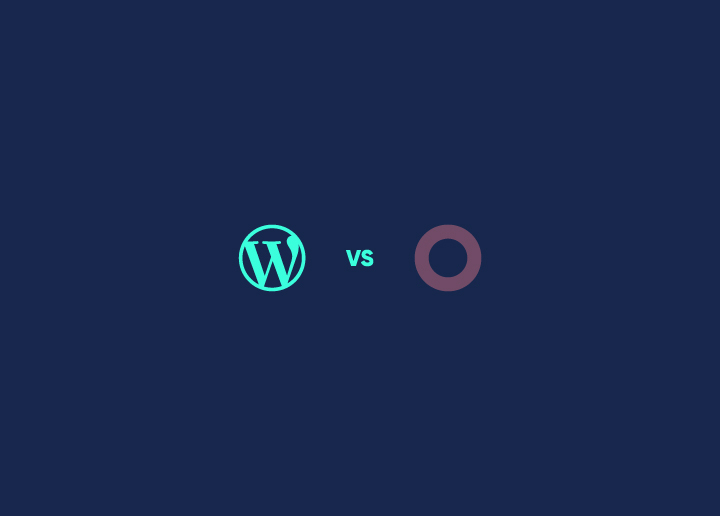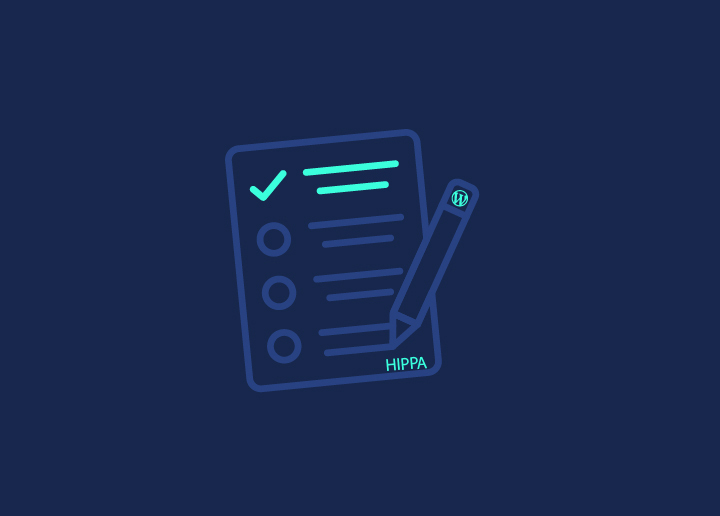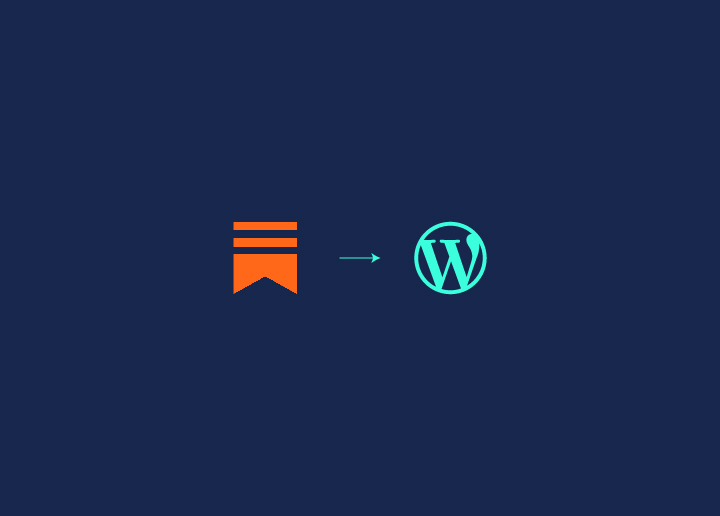Building a healthcare WordPress website that is HIPAA-compliant involves careful planning and execution. For WordPress website HIPAA development, you must consider design, functionality, and the stringent HIPAA regulations governing ePHI.
If you are someone looking to develop a HIPPA Compliant, you are at the right place. We are here with a guide for the development of the healthcare WordPress website HIPAA. It has some actionable insights to ensure your website complies with all necessary health information privacy and security measures expected in the healthcare industry.
So, let’s get started.
Contents
ToggleUnderstanding WordPress website HIPAA Development

Understanding HIPAA compliance for healthcare websites on WordPress can feel challenging, but it’s crucial when your site handles electronically protected health information (ePHI). The HIPAA Security Rule requires strict physical, technical, and administrative safeguards to protect ePHI. Compliance isn’t a one-time thing—it’s an ongoing commitment to securing your WordPress platform.
Here’s what you need to focus on:
- Technical Safeguards: Ensure secure transmission of data. Use encryption and limit access to sensitive information. Implement firewalls and secure login methods like two-factor authentication.
- Physical Safeguards: Control who can physically access your servers and backup data securely. This includes protecting hardware and managing access to your hosting environment.
- Administrative Safeguards: Establish policies and training for your team to ensure they understand HIPAA requirements. This includes appointing a HIPAA compliance officer and developing a response plan for data breaches.
Staying compliant isn’t just about following the rules—it’s about being proactive. Regularly update your security measures and work with experienced developers who know HIPAA regulations inside and out.
Also know: HIPAA Compliance for eCommerce: All You Need to Know
Prioritize Your Patients Privacy and Security
Get your Healthcare website HIPPA-compliant today to do your part.
HIPAA-Compliant WordPress Site Development: The Foundation
To build a HIPAA-compliant WordPress site, you need to:
- Have a deep understanding of HIPAA’s Privacy and Security Rules.
- Conduct a thorough risk assessment.
- Create a contingency plan for potential security incidents or breaches.
- Ensure that the systems in place, such as web hosting services and the Content Management System (CMS), adhere to HIPAA standards.
But what does this entail in practice? Let’s uncover the building blocks of a HIPAA-compliant WordPress site.
Selecting a HIPAA Compliant Hosting Provider
Think of your HIPAA-compliant hosting provider as the foundation stone of your healthcare website. The right provider should offer a bouquet of essential features such as:
- Dedicated servers
- Safe harbor compliance
- Data encryption at rest
- Stellar customer service
- Access controls
- Audit controls
- Contingency planning
An integral component of HIPAA-compliant hosting services is a Business Associate Agreement (BAA). This contract outlines the responsibilities for protecting Protected Health Information (PHI), forming a protective shield around your patient data.
Some HIPAA Complaint Hosting Providers:
Convesio
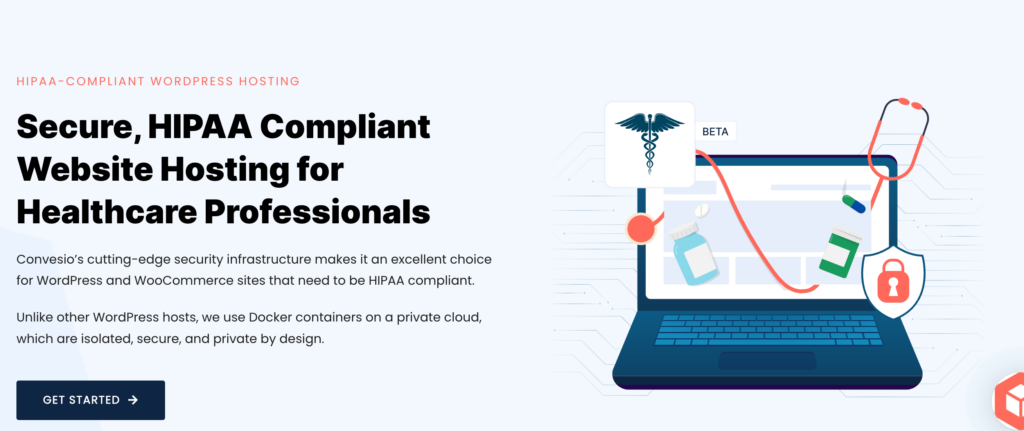
Convesio is the top choice for WordPress and WooCommerce sites needing HIPAA compliance in 2024. They use Docker containers in a private cloud for maximum security and privacy. Each website gets its own isolated container, which boosts security. They also offer Business Associate Agreements (BAA) to ensure data integrity and include security features at no extra cost.
Instead of traditional hosting like VPS or dedicated servers, Convesio’s setup is more secure. They use Amazon S3 for backups, too. They provide detailed audit logs for transparency and give every hosted site a Cloudflare Enterprise plan for free, which is usually worth $500
Liquid Web

Liquid Web is a hosting provider known for its reliability and commitment to keeping data safe, especially for healthcare organizations that need to comply with HIPAA regulations. They prioritize security and follow strict rules to make sure that sensitive healthcare information is protected.
Their services are designed specifically to meet the unique needs of the healthcare industry, making them a solid option for organizations that need to ensure the security of their data
HIPAA Vault
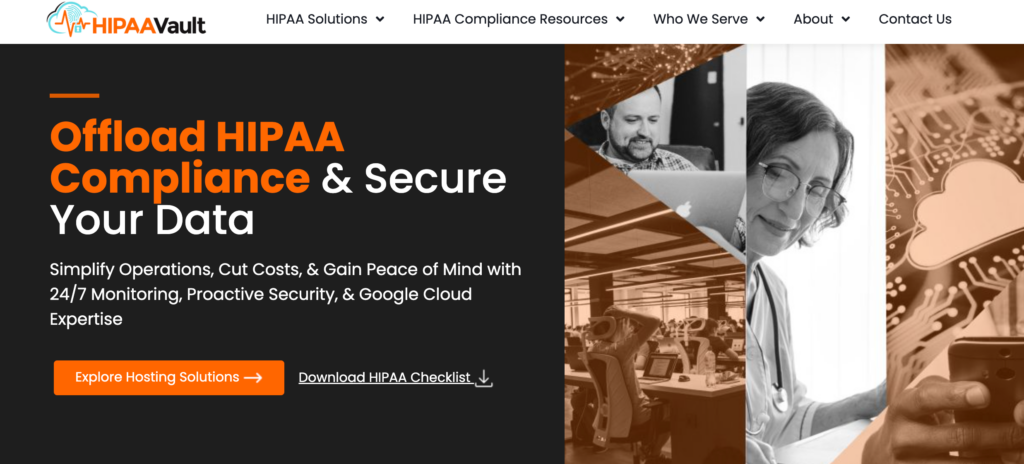
HIPAA Vault, previously known as VM Racks, a complete and fully managed WordPress platform designed for maximum security and HIPAA compliance. HIPAA Vault is committed to ensuring that your healthcare website adheres to strict HIPAA regulations.
Rest easy with their round-the-clock customer service, achieving an impressive 90% first-call resolution rate. HIPAA Vault takes a proactive stance, continuously monitoring and updating its infrastructure to reduce risks and strengthen overall security.
Learn more: Best WordPress Security Service Providers (And Plugins)
Establishing Strong Access Controls
In HIPAA compliance, setting solid access controls and implementing physical security controls are significant.
Why is this so important? Access controls ensure that only authorized individuals can access sensitive patient information. This is a crucial step in maintaining HIPAA compliance and protecting your healthcare data from unauthorized access.
WordPress websites can implement these access controls through:
- Unique usernames
- Strong passwords
- Multi-factor authentication
- IP geolocation technology
Ensuring Data Integrity with Regular Backups
Imagine losing all your patient data due to a system failure or cyberattack. Nightmare, isn’t it?
That’s where regular backups come into play. Healthcare organizations using WordPress should have encrypted backups stored securely to maintain the integrity and confidentiality of the data.
But it’s not enough to just have the backups. It’s crucial to test these backups for restoration regularly. This ensures reliable recovery procedures are in place in case of data loss.
Scheduling regular WordPress backups is like having a safety net for your data. It maintains up-to-date records and protects data in the event of a system failure, cyberattack, or data corruption. Now that we have laid the foundation, let’s look at how we can integrate HIPAA security measures into WordPress.
Know more: Best WordPress Backup Plugins
Integrating HIPAA Security Measures into WordPress
To create a HIPAA-compliant WordPress healthcare website, you must integrate strong security measures into WordPress:
Deploying Security Plugins and Firewalls
Using security plugins and firewalls on your WordPress site is like setting up a high-tech security system. Tools like Wordfence are crucial for managing and protecting Protected Health Information (PHI), helping you meet HIPAA requirements. These security plugins create secure audit trails, which track who accesses or changes electronic Protected Health Information (ePHI), supporting HIPAA compliance.
To stay in line with HIPAA data privacy rules, you should regularly audit your firewall to ensure it hasn’t been tampered with or misconfigured. SIEM (Security Information and Event Management) software can improve your ability to detect and respond to unauthorized access by analyzing detailed logs and identifying unusual activities.
Read More: Best WordPress Maintenance Service Providers
Implementing Encryption for Data Protection
Encryption is the magic spell that turns your readable data into gibberish, protecting it from unauthorized access. The HIPAA Security Rule mandates that encryption must be implemented for ePHI in transit and at rest to safeguard patient information.
Encryption of data in transit can be achieved using SSL/TLS to ensure the secure transmission of ePHI, which is essential for HIPAA compliance in WordPress environments.
Custom development can be employed to integrate additional HIPAA safeguards into WordPress, like SSL encryption, tailored access controls, and compliant audit trails. Now, let’s look at the role of custom development in HIPAA compliance.
Do not miss: EEA Regulations: Implement Google Consent Mode v2 on Your Website
The Role of Custom Development in HIPAA Compliance
Custom WordPress development is like tailoring a suit; it ensures a perfect fit. In the context of HIPAA compliance, custom development specifically addresses the lack of compliance in the general-purpose design of WordPress. To align with HIPAA regulations, WordPress requires custom development of plugins and add-ons.
Regular reviews and updates in website design and security measures through custom development are important for maintaining HIPAA compliance over time. Let’s explore this further.
Tailoring User Authentication Protocols
User authentication protocols are like the keys to your healthcare data treasure chest. Strong user authentication practices are essential for protecting WordPress websites in compliance with HIPAA.
WordPress websites should implement rate limiting and two-factor authentication (2FA) for all administrator accounts to support HIPAA compliance.
Creating Custom Audit Trails
Custom audit trails are like a CCTV system for your data. They monitor activities related to ePHI, ensuring adherence to HIPAA compliance requirements. Custom audit trails must record all activity connected to ePHI without exception.
Learn: Implement Cookie Consent (GDPR/CCPA/EU Cookie Law) in WordPress
Aligning WordPress Features with HIPAA Privacy Rule
WordPress must adhere to the HIPAA Security Rule, which demands comprehensive administrative, physical, and technical measures to safeguard electronically protected health information.
Under HIPAA, protected health information includes:
- a patient’s health records
- prescriptions
- doctors visited
- their name
- contact details
HIPAA requires specific authorization for the use of electronic protected health information (ePHI) for purposes such as marketing or for legal proceedings in court.
Confidentiality Agreements and Training
Confidentiality agreements and staff training are like the instruction manual for handling sensitive patient data. Employee training is a critical element in maintaining HIPAA compliance of a WordPress website.
It is essential for both administrators and internal users to receive proper training on the platform as well as on HIPAA’s Privacy and Security Rules.
Confidentiality agreements, paired with regular training, are fundamental for staff to correctly manage protected health information and ensure the WordPress healthcare website’s compliance with HIPAA.
Managing Patient Consent and Authorization Forms
Managing patient consent and authorization forms is a crucial task that requires careful attention. Special plugins such as HIPAAtizer can be used to create and embed HIPAA-compliant web forms for patient consent and authorizations on WordPress websites.
These plugins are designed to ensure that electronically Protected Health Information (ePHI) is encrypted in transit and stored securely, conforming to HIPAA standards.
HIPAA-compliant forms can include secure payment integration through services like Stripe and PayPal, enabling transactions to be processed safely through the forms.
Continuous Compliance: Updating and Auditing Your WordPress Site
The journey to HIPAA compliance is not a destination but a continuous journey. Auditing your website with regular updates to WordPress core, themes, and plugins are essential to minimize vulnerabilities and maintain HIPAA compliance.
Conducting regular risk analyses helps WordPress sites identify and address vulnerabilities, reducing the risks associated with ePHI to reasonable levels.
Custom development can be utilized to implement tailored security measures within WordPress that are in strict alignment with HIPAA requirements, making your website WordPress HIPAA compliant.
Also know: Best WordPress Core Web Vitals Optimization Services in 2024
Scheduling Regular Compliance Reviews
Regular compliance reviews are like routine health check-ups for your website. Healthcare organizations must perform routine risk analysis to identify potential vulnerabilities within their WordPress sites.
Continual review of the WordPress site’s compliance with HIPAA is crucial to ensure that the organization stays aligned with standards over time. Adjustments to WordPress site operations and protocols are necessary based on the outcomes of the compliance reviews to maintain HIPAA compliance.
Staying Informed on HIPAA Updates
Staying informed about HIPAA updates is like keeping your finger on the pulse of compliance regulations. Healthcare providers using WordPress should actively keep themselves informed about updates to HIPAA regulations to ensure that their website development and maintenance practices remain compliant.
Choosing the Right Development Partner
Choosing the right WordPress development partner is a critical decision that can make or break your HIPAA compliance journey. At Seahawk, we have hands-on experience in developing HIPAA compliant WordPress websites for safeguarding patient health information and ensuring adherence to compliance standards.
A reliable development partner should possess a clear strategy for responding to breaches and emergencies, in alignment with HIPAA guidelines, to include such elements as breach notifications, risk mitigation strategies, and open communication channels.
Summary
In summary, achieving HIPAA compliance for a WordPress healthcare website is a complex but feasible task. It requires understanding HIPAA regulations, implementing a secure hosting environment, deploying robust access controls, ensuring data encryption, and creating custom audit trails.
Regular compliance reviews and staying updated on HIPAA regulations are equally important. Partnering with experienced HIPAA development specialists can provide the necessary expertise and support to navigate this journey. It’s a challenging path, but with the right tools and partners, you can create a secure, compliant, and efficient WordPress healthcare website.



